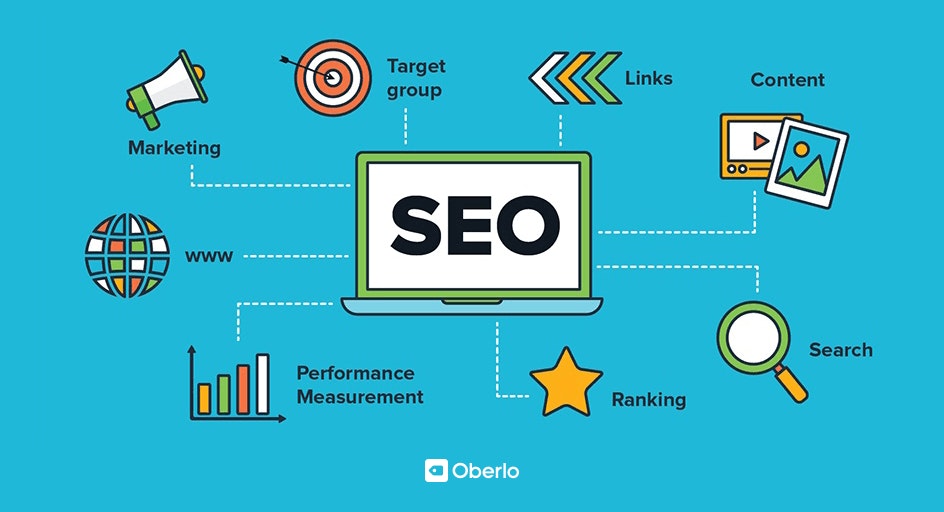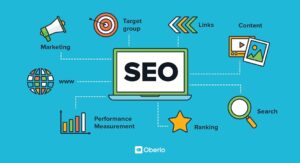

Introduction
In today’s digital age, having an online presence is crucial for businesses of all sizes. But simply having a website is not enough, you need to ensure that it is easily discoverable by your target audience. This is where SEO, or Search Engine Optimization, plays a vital role.
SEO helps your online business by improving its visibility on search engine results pages. By implementing various strategies and techniques, you can optimize your website’s content, structure, and performance to rank higher in search engine rankings. This means that when potential customers search for products or services related to your business, they are more likely to find your website.
With the right SEO strategy, you can attract organic traffic to your website, increase brand visibility, and ultimately drive more conversions. SEO is an ongoing process that requires continuous monitoring, analysis, and optimization. By investing time and effort into SEO, you can reap long-term benefits for your online business.
So, if you want to take your online business to the next level and stay ahead of the competition, it’s time to embrace the power of SEO. Start optimizing your website today and watch your online presence soar.
The importance of SEO for online businesses
Having a website is not enough to succeed in the competitive online marketplace. Your website needs to be easily discoverable by your target audience, and this is where SEO comes into play. SEO is crucial for online businesses for several reasons.
Firstly, SEO helps improve your website’s visibility on search engine results pages. When potential customers search for products or services related to your business, you want your website to appear on the first page of search results. Studies have shown that the majority of users do not go beyond the first page of search results, so if your website is not ranking well, you may be missing out on valuable traffic.
Secondly, SEO helps increase organic traffic to your website. Organic traffic refers to visitors who find your website through non-paid search engine results. This type of traffic is highly valuable as it is more likely to convert into leads or sales. By optimizing your website for relevant keywords and improving its overall performance, you can attract more organic traffic and increase your chances of converting visitors into customers.
Finally, SEO helps build brand credibility and trust. When your website ranks high in search engine results, it signals to potential customers that your business is reputable and trustworthy. People tend to trust search engines, so if your website appears at the top of the results, it can significantly impact their perception of your brand. By investing in SEO, you can establish your online business as an authority in your industry and gain the trust of your target audience.
How search engines work
To understand SEO, it’s essential to have a basic understanding of how search engines work. Search engines use complex algorithms to crawl, index, and rank websites based on various factors. Here’s a simplified overview of the process:
- Crawling: Search engines use bots, also known as spiders or crawlers, to discover and collect information about websites. These bots crawl the web by following links from one page to another. They gather data about the content and structure of each page they visit.
- Indexing: Once a webpage is crawled, search engines store the collected information in their index. The index is like a massive library that contains information about all the websites the search engine has crawled. It allows search engines to retrieve relevant results quickly when a user performs a search query.
- Ranking: When a user enters a search query, search engines use their algorithms to determine the most relevant and valuable results from their index. These algorithms take into account various factors, such as the relevance of the content, the quality of the website, and the user’s location and search history. The search engine then ranks the results based on their perceived relevance and displays them to the user.
Understanding how search engines work is crucial for optimizing your website for SEO. By aligning your website’s content, structure, and performance with search engine requirements, you can improve your chances of ranking higher in search engine results and attracting more organic traffic.
SEO techniques and best practices
To achieve optimal results with SEO, it’s important to implement various techniques and best practices. Here are some key strategies to consider:
On-page optimization
On-page optimization refers to optimizing the content and structure of your website’s individual pages. This includes optimizing page titles, headings, meta descriptions, URL structures, and keyword usage. Here are some best practices for on-page optimization:
- Conduct keyword research to identify relevant keywords for each page and incorporate them naturally into your content.
- Optimize your page titles and meta descriptions to be concise, descriptive, and compelling.
- Use headings and subheadings to structure your content and make it easier for search engines to understand.
- Ensure your website has a clean and user-friendly URL structure that includes relevant keywords.
- Optimize your images by using descriptive file names and alt tags.
Off-page optimization
Off-page optimization refers to activities that are done outside of your website to improve its visibility and reputation. This includes building high-quality backlinks, social media marketing, influencer outreach, and online reputation management. Here are some best practices for off-page optimization:
- Build high-quality backlinks from reputable websites in your industry. This can be done through guest blogging, creating valuable content that others want to link to, or reaching out to influencers for collaborations.
- Engage in social media marketing to increase brand visibility and drive traffic to your website. Share valuable content, interact with your audience, and encourage social sharing.
- Monitor and manage your online reputation by responding to customer reviews and addressing any negative feedback promptly and professionally.
Keyword research and targeting
Keyword research is a crucial aspect of SEO. By identifying relevant keywords and incorporating them into your content, you can improve your website’s visibility for search queries related to your business. Here are some steps to conduct effective keyword research:
- Start by brainstorming a list of potential keywords related to your business.
- Use keyword research tools, such as Google Keyword Planner or SEMrush, to gather data on search volume and competition for each keyword.
- Analyze your competitors’ websites to see what keywords they are targeting and ranking for.
- Prioritize keywords that have a good balance of search volume and competition. Focus on long-tail keywords that are more specific and have higher chances of conversion.
Using the right keywords strategically throughout your website’s content can help search engines understand what your website is about and improve your chances of ranking higher for relevant search queries.
SEO tools and resources
The field of SEO is constantly evolving, and there are many tools and resources available to help you stay up-to-date and optimize your website effectively. Here are some essential SEO tools and resources to consider:
- Google Analytics: A powerful analytics tool that provides valuable insights into your website’s performance, traffic sources, and user behavior. It helps you track your SEO progress and identify areas for improvement.
- Google Search Console: A free tool provided by Google that allows you to monitor and maintain your website’s presence in their search results. It provides data on search traffic, indexing issues, and more.
- Yoast SEO: A popular WordPress plugin that helps you optimize your website’s content for SEO. It provides real-time analysis and suggestions for improving your on-page optimization.
- Moz: A comprehensive SEO software suite that offers a wide range of tools, including keyword research, link building, rank tracking, and more.
These are just a few examples of the many SEO tools and resources available. It’s important to explore different options and find the ones that work best for your specific needs and goals.
Measuring and tracking SEO success
Measuring and tracking the success of your SEO efforts is crucial to understanding what’s working and what needs improvement. Here are some key metrics to consider when evaluating your SEO performance:
- Organic traffic: The number of visitors coming to your website through non-paid search engine results. This metric indicates the effectiveness of your SEO strategies in attracting organic traffic.
- Keyword rankings: The positions your website ranks for specific keywords in search engine results. Tracking keyword rankings helps you determine if your optimization efforts are paying off.
- Conversion rate: The percentage of visitors who take a desired action on your website, such as making a purchase or filling out a contact form. Tracking your conversion rate helps you assess the quality of your organic traffic and the effectiveness of your website’s user experience.
Regularly monitoring these metrics and making data-driven decisions based on the insights gained can help you continually improve your SEO strategy and achieve better results.
Conclusion and next steps
In conclusion, SEO is a crucial aspect of running a successful online business. It helps improve your website’s visibility, attract organic traffic, and build brand credibility. By implementing various SEO techniques and best practices, conducting thorough keyword research, utilizing the right tools and resources, and measuring and tracking your SEO success, you can optimize your website for search engines and drive more conversions.
If you haven’t already, now is the time to start investing in SEO. Take the necessary steps to optimize your website, monitor your progress, and make adjustments as needed. SEO is an ongoing process, and staying up-to-date with the latest trends and best practices is key to maintaining a competitive edge in the online marketplace.
So, embrace the power of SEO and watch your online business soar to new heights. Your target audience is out there, waiting to discover your website. Make it easy for them to find you and reap the long-term benefits of a well-optimized online presence. Start your SEO journey today and see the difference it can make for your online business.





